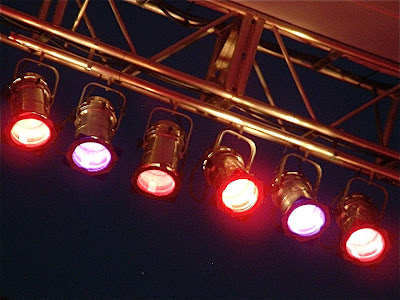 Spyro Gyra played to a record Clark County Amphitheater concert series crowd tonight, and blew them away. The place was about full an hour before the 8 pm showtime. It was awesome. I got some pretty decent pics.
Spyro Gyra played to a record Clark County Amphitheater concert series crowd tonight, and blew them away. The place was about full an hour before the 8 pm showtime. It was awesome. I got some pretty decent pics.
 Oh, yeah! Let There Be Light: BobbyG do luvs dem parcans.
Oh, yeah! Let There Be Light: BobbyG do luvs dem parcans. Above, our local weather dude Nathan Tannenbaum; below, 105.7 FM Smooth Jazz's Cat Lee.
Above, our local weather dude Nathan Tannenbaum; below, 105.7 FM Smooth Jazz's Cat Lee.



 Above, our joyous homie Tom Schuman.
Above, our joyous homie Tom Schuman.
 Above, Julio Fernandez, one Bad Boy guitarist.
Above, Julio Fernandez, one Bad Boy guitarist. Below: Vegas's Bonny B. on tubs. OK, imagine a drummer that is perhaps the melded sum of Pepe Jimenez and Eddie Garcia, and sings like Stevie Wonder to boot. I'm not exaggerating. I got my first glimpse of Bonny nearly two years ago one night when he subbed with Ronnie Foster at The Artisan.
Below: Vegas's Bonny B. on tubs. OK, imagine a drummer that is perhaps the melded sum of Pepe Jimenez and Eddie Garcia, and sings like Stevie Wonder to boot. I'm not exaggerating. I got my first glimpse of Bonny nearly two years ago one night when he subbed with Ronnie Foster at The Artisan.More on him below (YouTube clip at the end of this post).

 Above and below, the eminent Jay Beckenstein.
Above and below, the eminent Jay Beckenstein.

 Above, bassist Scott Ambush took a solo that was just sick, man!
Above, bassist Scott Ambush took a solo that was just sick, man!

 That was off the scale fine. A simply great event.
That was off the scale fine. A simply great event.OK, a YouTube clip I found featuring Bonny B. soloing at the Indianapolis Jazz Festival.
See what I said? 'eh?
After the show, there was this monster gridlock traffic jam, peeps tryin' to get out on to Grand Central Parkway. Jeesh. Almost nobody knows that you can go the other way, circle around behind the Clark County Government Center buildings, and drop out onto the underpass on Bonneville heading toward Main Street.
I was outa there in about two minutes, LOL!
CODA: BONUS CLIP
'nuther Spyro YouTube clip. Killer bass ride in this cut. Enjoy.
SUNDAY RUMINATION
Y'know, last night I missed an opportunity to spread the Santa Fe gospel to thousands of hip music fans, duh. Came back to my car and someone had been in the parking lot during the show sticking little ad postcards on car windows (I forget what they were hawking; I tossed it, 'cuz it looked pretty garish).
I did, however, have a bumper stick / billboard etc idea recently. Terse and to the point:
 Now, that's just a two-minute draft jpeg dump out of Adobe Illustrator. But, go ahead, take the challenge. Google it, see what happens.
Now, that's just a two-minute draft jpeg dump out of Adobe Illustrator. But, go ahead, take the challenge. Google it, see what happens.We own the search results. Look at the top five. That is largely my doing. Didn't spend a penny either. Meta tags, baby, meta tags (and, increasingly, reciprocal links). Peeps spend big bucks to get "Page One, Above the Fold" Google placement.
So, maybe I'll start handing out bumper stickers and post cards with nothing but the foregoing on them. One simple marketing tactic.
BOBBYG'S BOOK REPORT UPDATE
From time to time I've posted thoughts about books I've been reading, and have gotten responses indicating that some of you dig them, even if they're O/T (off-topic). So, here's what I've just recently finished:

 Nicholas Nassim Taleb is one of my favorite dudes. He's the "Fooled by Randomness" cat (subtitle: "The Hidden Role of Chance in the Markets and in Life"), a noted hedge fund trader and snarky iconoclast who takes a sarcastic dim view of the current fashion in quantitative risk analytics (which is a lot of what I've worked in since hanging up my axe to go White Collar back in 1986).
Nicholas Nassim Taleb is one of my favorite dudes. He's the "Fooled by Randomness" cat (subtitle: "The Hidden Role of Chance in the Markets and in Life"), a noted hedge fund trader and snarky iconoclast who takes a sarcastic dim view of the current fashion in quantitative risk analytics (which is a lot of what I've worked in since hanging up my axe to go White Collar back in 1986).One of my favorite Taleb-isms: "Knowledge is overrrated," LOL! (He means by that, crap trivia that is really just random noise doing nothing for us in terms of sharpening critical thinking ability.)
"The Black Swan" is his follow-up book, one that picks up with and further explores the fundamental riffs set forth in the first book; mainly that we continue to perceive the world and make decisions burdened with vestigial neural wiring more suited to our primitive hunter-gatherer past-- an environment where a "Shoot/Ready/Aim" M.O. had adaptive survival value in a world of proximate, relatively simple, and often deadly omnipresent risks. Consequently, nowadays we are prone to seeing casual "patterns" where none exist, and, conversely, frequently miss looming large scale abrupt events with (inevitably post-hoc) "identifiable" causes (were we not so fixated on seeing Jesus in the pizza slice or The Virgin in the billboard, etc). Moreover, we tend to chronically ("neurotically") overattribute "causality," whereas many phenomena are merely the result of pure transient, but twitchy, randomness (one of my fav sayings is "chance is lumpy").
I dig his stuff big-time. His flip sense of humor is a gas, and his quant chops and erudition are undeniable. I gave my pal Conti a copy of "Fooled by Randomness" for Christmas. He dug it as well (lotta peeps don't know that Robert has some pretty heavy finance/quant credentials as well as his monster guitar abilities). Some Taleb glossary snark (a PDF file):
Empty-suit problem (or “expert problem”): Some professionals have no differential abilities from the rest of the population, but for some reason, and against their empirical records, are believed to be experts: clinical psychologists, academic economists, risk “experts,” statisticians, political analysts, financial “experts,” military analysts, CEOs, et cetera. They dress up their expertise in beautiful language, jargon, mathematics, and often wear expensive suits.Gotta love it. He's right (though not universally loved by the anal-retentive Suits cohort).
Fooled by randomness: the general confusion between luck and determinism, which leads to a variety of superstitions with practical consequences, such as the belief that higher earnings in some professions are generated by skills when there is a significant component of luck in them.
Statistical regress argument (or the problem of the circularity of statistics): We need data to discover a probability distribution. How do we know if we have enough? From the probability distribution. If it is a Gaussian, then a few points of data will suffice. How do we know it is a Gaussian? From the data. So we need the data to tell us what probability distribution to assume, and we need a probability distribution to tell us how much data we need. This causes a severe regress argument, which is somewhat shamelessly circumvented by resorting to the Gaussian and its kin.
___________
Robert A. Burton's "On Being Certain: Believing You Are Right Even When You're Not" is equally interesting, and resonates with a lot with Taleb's views. Dr. Burton, Former Associate Chief, Department of Neurosciences UCSF-Mt. Zion Hospital, etc, posits that, while we think we decide stuff rationally, much of our "feelings of truth" have a sub- cerebral cortex basis. i.e., that perceptions and subsequent decisions frequently do not arise from within areas of the brain we assume are the locales of "cognitive awareness," but instead emanate from within more primitive areas of the brain (can you say "limbic system"?). Like Taleb, he ascribes this to evolutionary underpinnings and imperatives.
Dr. Burton writes a lot of cool articles for Salon.com, which is where I first got hip to him.
Aside from my music Jones, I'm into all this high-falutin' "epistemology" stuff (love that $50 word, LOL), i.e., how do we really "know" what we think we really know? Are we just kidding ourselves? Are we irreducibly slaves to being "fooled by randomness" to a great extent? Can objective "truth" be totally "proven" by sheer force of human deductive logic? (Einstein et al) Or, is "sense experience" (the empirical) the entire Real Deal? (I am dubious of both assertions. Color me sorta "Wilber-esqe" in such regard, and I have to remain a bit humbly "agnostic" with respect to whether larger or different objective truths lie beyond the reach of our intellects and senses.)
Been workin' on a textbook on "Critical Thinking," the upshot of my teaching experiences at UNLV and CCSN (and the inadequate required textbooks I had to use, as well as the equally wanting ones publishers comped me, hoping I'd require them). A lot of my interest here goes to the problem of "persuasion." As I would pose to my students, "what if your logic and facts are bulletproof, but at the end of the day, you cannot Make The Sale? You don't change any opinions; what have you really accomplished, in terms of resolving an issue so we can all move on?"
That whole "change" thingy. It is so difficult (that's why the bookstores are so full of pop psych personal improvement lit; were it easy, there'd be maybe all of two or three on the subject). See "Change or Die" (which morphed into another cool book).
I'm about 3+ years behind schedule, but I keep slogging away (between nursing home trips, gig photoshoots, blogging, podcasting, and trying to find another day gig). With Taleb and Burton it looks as though I'm now at the end of my topical/citational research. Fifty some books. You know you're done when you start seeing the authors increasingly citing cats you previously read. Time to pick the manuscript back up and finish it.

No comments:
Post a Comment